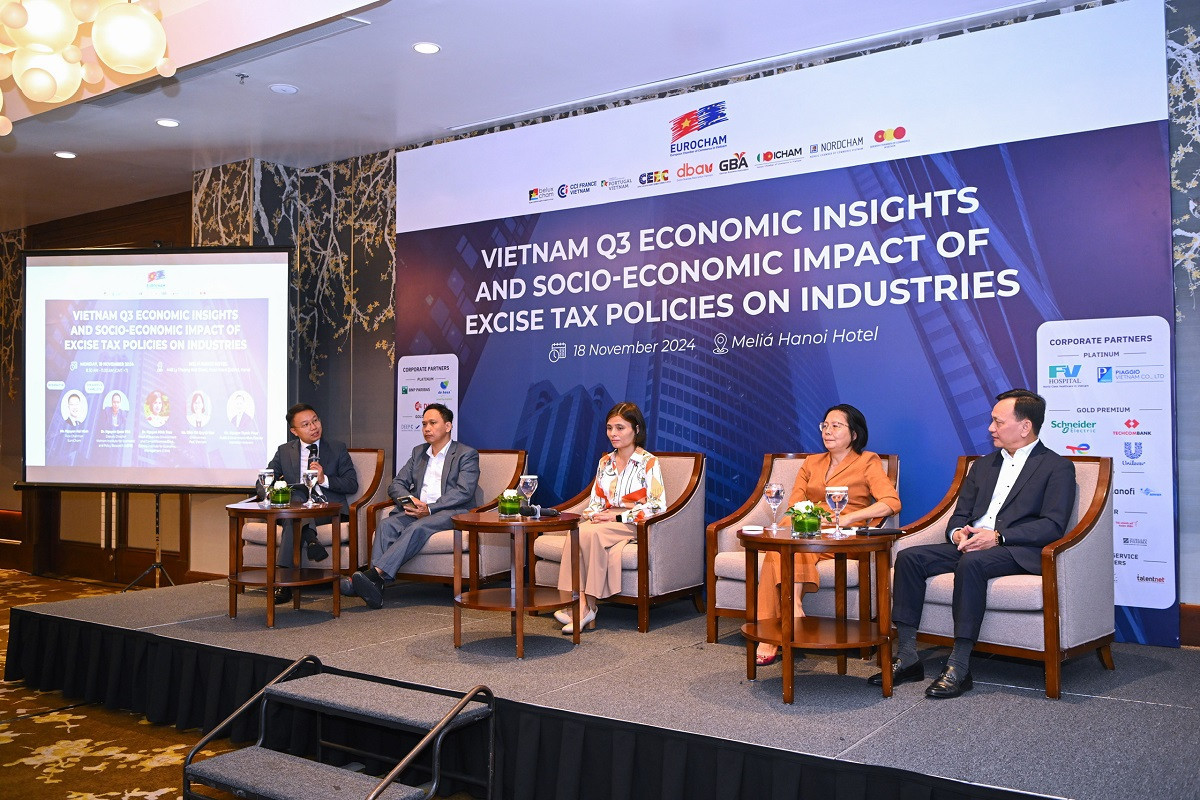The proposed increase in the Special Consumption Tax (SCT) on beer, from the current rate of 65% to 80% in 2026 and an annual 5% increment to reach 100% by 2030, has sparked concerns about potential economic repercussions.
The draft amendment to the Law on Special Consumption Tax, currently under discussion during the 8th session of the 15th National Assembly, outlines three options for increasing the tax on beer.
Proposed Options for Beer Tax Hikes
1. Option 1 (Ministry of Finance): Raise the current rate of 65% to 70% in 2026, with annual 5% increments to 90% by 2030.
2. Option 2 (Ministry of Finance): Increase to 80% in 2026, with annual 5% increments to 100% by 2030.
3. Option 3 (Beer, Alcohol, and Beverage Association): Start increasing the tax in 2027 by 5% every two years, reaching 80% by 2031.

At a workshop on the socioeconomic impacts of SCT policies organized by the European Chamber of Commerce in Vietnam (EuroCham) on November 18, Dr. Nguyen Minh Thao from the Central Institute for Economic Management (CIEM) expressed concerns over the Ministry of Finance’s preference for Option 2.
“Few countries have such a continuous tax escalation,” Dr. Thao remarked.
She noted that the Ministry’s impact assessment lacks comprehensive analysis, relying heavily on subjective views without sufficient scientific evidence or data to justify the need for strict controls on beer. Additionally, the inter-sectoral impacts of the tax, which affects 21 related industries, have not been adequately evaluated.
CIEM provided several data points to guide policymakers in weighing the pros and cons of the proposals:
1. Impact on the Beer Industry:
- Option 1: Value added in the beer industry would drop by 8% in 2026, amounting to a cumulative loss of over VND 44 trillion between 2026–2030.
- Option 2: A sharper decline of 11% in 2026, with a cumulative loss of over VND 61 trillion.
- Option 3: A 7.2% reduction in 2027, totaling VND 38 trillion in losses by 2031.
2. Impact on National GDP:
- Option 1: GDP could decline by over VND 14 trillion (0.035%).
- Option 2: GDP could fall by VND 32.3 trillion (0.08%).
- Option 3: A smaller GDP reduction of VND 8.59 trillion (0.017%).
3. Impact on Labor Income:
- Option 1: Labor income could drop by over VND 3.4 trillion.
- Option 2: A sharper decline of VND 4.6 trillion.
- Option 3: A relatively smaller impact of VND 2.2 trillion.
4. Impact on State Budget Revenue:
- Option 1: Indirect taxes would rise by VND 6.469 trillion from 2026–2030, but corporate income taxes would drop by VND 1.230 trillion, leaving a net gain of VND 5.149 trillion.
- Option 2: A higher net gain of VND 6.807 trillion due to increased indirect taxes of VND 8.559 trillion but reduced corporate income taxes of VND 1.752 trillion.
- Option 3: A net increase of VND 3.330 trillion from 2027–2031.
However, state revenue gains are likely short-lived, as declining beer industry revenue would eventually reduce contributions from related sectors.

Nguyen Thanh Phuc, External Relations Director at Heineken Vietnam, called the 100% SCT hike a "very negative policy," warning of far-reaching consequences for both large corporations and Vietnam’s small and medium enterprises (SMEs) within the alcohol industry supply chain.
“Raising taxes will discourage investment, particularly foreign investment, as businesses are already grappling with rising input costs and compliance with new green economy policies,” Phuc noted.
The potential ripple effects include job losses, reduced market participation for SMEs, and hindered GDP growth. Social welfare challenges, such as increased unemployment, could also arise as businesses downsize or shut down.
Dr. Thao emphasized caution when proposing tax increases due to their direct impact on economic growth. A GDP reduction of 0.08%, as projected under Option 2, could undermine the National Assembly’s economic targets.
Dinh Thi Quynh Van, Chairperson of PwC Vietnam, agreed with the need for higher taxes but advocated for a balanced approach that ensures alignment between state revenue goals and the interests of businesses and industries.
Binh Minh